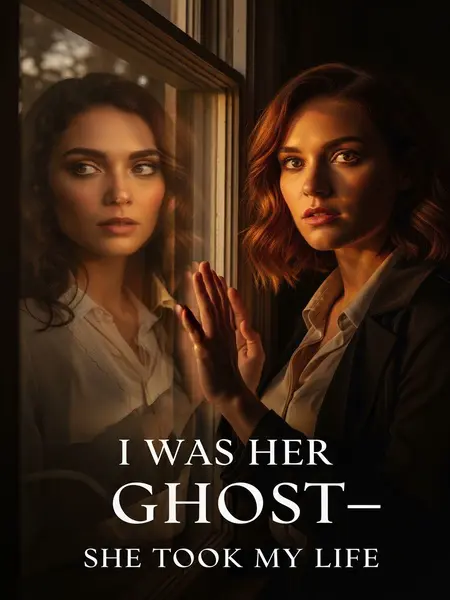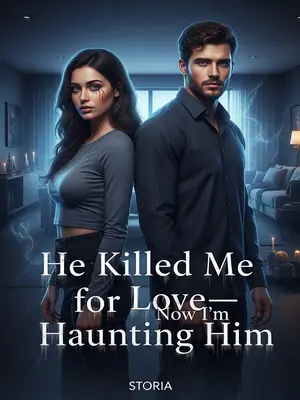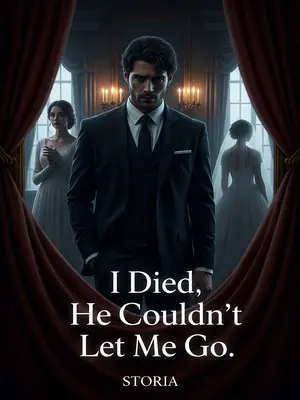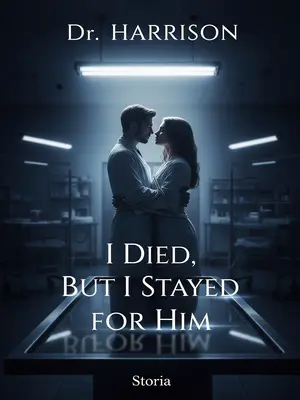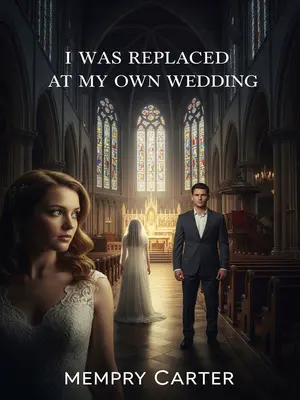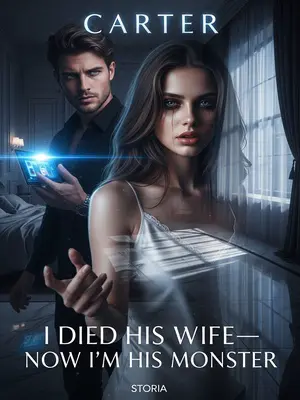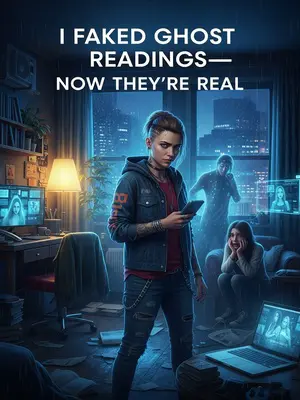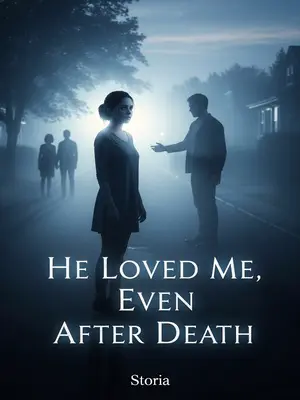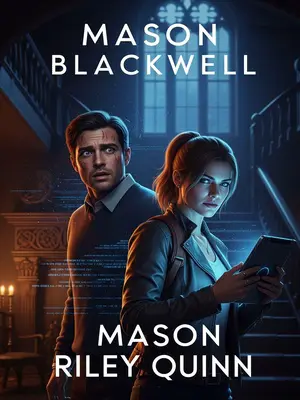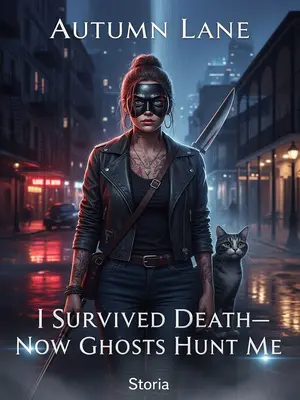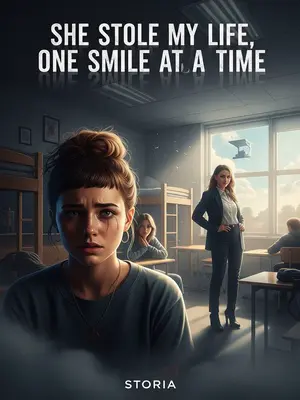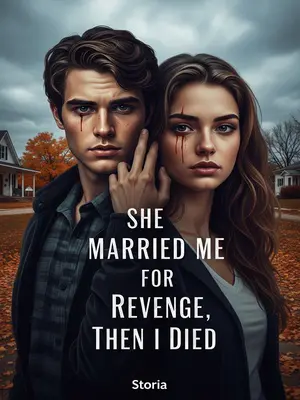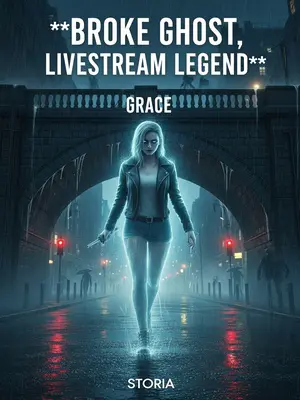Chapter 2: The Sheriff’s Bargain
When Savannah returned, it was already March in spring.
The air was crisp, the trees just beginning to bud. The house felt lighter, as if it was waiting for her to come home.
I walked past her, knowing she couldn’t see me, but still hoping to try.
I hovered at her side, whispering her name. Maybe, just maybe, she’d hear me.
“Autumn?” She suddenly looked at my spot.
Her eyes widened, searching the empty air. My heart skipped a beat.
“You’re late,” I pouted. “The first snow has melted. I wanted to melt fresh snow and brew tea with you. I never thought you’d come so late…”
I tried to sound playful, but my voice trembled. I’d missed her more than I realized.
“It is a bit late.” She pulled down her hood, the dark circles under her eyes even heavier. “This business was really tough. But, it succeeded.”
Her voice was tired, but there was pride in it. She’d done what she set out to do.
“Just, it was very hard.” She lifted her sleeve, revealing obvious, bloody wounds on her wrist.
The sight made my stomach drop. I wanted to reach out, to help her, but I couldn’t.
“Does it hurt?” My voice choked.
I hated seeing her in pain. She’d suffered so much already.
If I had known she’d be hurt, I would have stopped her.
I blamed myself, even though I knew it wasn’t fair. Guilt is a heavy thing.
She brushed her sleeve to cover the wound.
She tried to hide it, but I saw the way her hands shook. My heart twisted.
“Don’t worry. It’s almost healed.”
She forced a smile, but I knew she was lying. Some wounds never really heal.
I’d heard about her in the market.
The rumors spread like wildfire—Savannah Lane, the girl who’d taken down a governor. People whispered her name with awe and fear.
They said Savannah Lane was a heroine, who dug up evidence of corruption in the governor’s office.
She’d risked everything to do the right thing. It was the kind of story people told around campfires, the kind that inspired songs and legends.
“This was Caleb’s trap.” She shook her head and sighed.
Her voice was heavy, full of regret. She’d been used, betrayed by someone she thought she could trust.
Fame might not be a good thing for her.
The more people knew her name, the more dangerous her life became. I worried for her, every single day.
I knew—the more fame and profit, the heavier the burden.
She carried the weight of the world on her shoulders, and it was starting to show. Her shoulders slumped, her eyes always tired now.
Caleb wanted a controllable pawn.
He saw Savannah as a means to an end, nothing more. It made my blood boil.
And Autumn fit the requirements of the county, so she entered the game.
She played her part, but I knew it was only a matter of time before things fell apart.
I sighed for my butterfly, who once had free wings but was now caged by the gilded strings of the powerful.
She deserved better. I wished I could set her free, but all I could do was watch.
“I used to think he just wanted me to check those goods.” Her voice grew lower.
She stared at her hands, lost in thought. The truth was always more complicated than it seemed.
“Later I realized I was too naive. He wanted the governor’s utter ruin. How could he let go of such leverage?”
She shook her head, frustration etched on her face. She’d been caught in a game she never wanted to play.
“I watched as weapons and armor were found in the governor’s mansion, and heard the unwilling screams. Under the dark sky, blood flowed like rivers. Now, when I close my eyes, I have nightmares.”
Her words sent a chill down my spine. I wanted to comfort her, but I didn’t know how.
I wanted to pat her back, but it was useless.
I reached out, my hand passing through her. The helplessness was suffocating.
“Autumn, don’t be afraid, I’m here. I believe you.”
I whispered the words, hoping they’d reach her. Sometimes, faith is all you have.
I bent over her, trying to shield her.
I tried to shield her from the world, even if it was only in spirit.
“Autumn, it wasn’t your fault. You were just used.”
She needed to hear it, to believe it. I repeated the words until I believed them myself.
I comforted Autumn in the Rosewood House for a long time.
We spent hours talking, sharing stories and dreams. It was a small comfort, but it helped.
Though she felt guilty, this business truly brought benefits to the house.
The Rosewood House was thriving, thanks to her. The girls had more choices, more freedom. It wasn’t perfect, but it was better.
I saw more and more guests, including the rich and powerful.
The house was bustling, alive with energy—music, laughter, footsteps echoing down the halls. People came from miles around, drawn by the promise of something new.
The Rosewood House’s reputation spread through the underworld.
It became a legend in its own right—a place of secrets and power, run by women who refused to be controlled.
People said the house was no longer a den of sin, but a spy ring like the old Pinkerton Agency.
The comparison made me smile. The Pinkertons—those famous detectives from American lore, always chasing justice and rebellion. Savannah would have liked that.
“Is this kind of reputation really good?” I wanted to ask Autumn.
I worried about what it meant, about the dangers that came with power.
Autumn just sipped her tea. “I’d rather the world respect and fear us than one day abandon and despise us.”
Her words were pragmatic, shaped by hard experience. She wasn’t naive—not anymore.
I understood a little.
Maybe Autumn also hoped the house could have more power and not be controlled by others.
I realized she was right. Sometimes, you have to take control of your own story.
And I thought so too.
We were in this together, come what may.
The wind picked up outside, and the sky was tinged with blood.
The sunset painted the world in shades of red and gold, a reminder that beauty and danger often go hand in hand.
As the house’s fame grew, Autumn became more and more haggard.
The long hours took their toll. She looked older, her eyes ringed with shadows. I worried for her, but she refused to slow down.
She did the work of three people alone.
She was everywhere at once—organizing events, gathering information, handling business. It was exhausting just to watch.
Before dawn, she arranged the house’s décor, at noon gathered intelligence, and at night handled Caleb’s tasks.
Her days bled into nights, her nights into days. She lived on coffee and determination, always pushing forward.
“Even Wall Street isn’t this busy,” Autumn sighed heavily. “If I’d known it’d be like this, I wouldn’t have come.”
She tried to joke, but the exhaustion was clear in her voice. I wished I could lighten her load.
She complained, but never stopped working.
She was relentless, driven by a sense of duty I admired.
Today there was less to do, so she could rest early.
For once, she allowed herself a break, curling up on the couch with a book. I sat beside her, enjoying the quiet.
But she still stared at the patterns under the lamp, eyes filled with tears.
She traced the designs with her finger, lost in thought. I knew she was thinking about the future, about all the things she still wanted to do. I wondered what dreams she’d left behind.
“In a few days, Hailey from the house will get married.” She suddenly said, her voice clearly choked.
Her words caught me off guard. I hadn’t realized how much it meant to her.
“Do you think she’ll be happy?” She turned to ask me.
Her eyes searched mine, looking for reassurance I couldn’t give.
I didn’t dare look at her, only said softly, “I don’t know.”
I wanted to promise her a happy ending, but life doesn’t work that way.
I don’t know their future.
None of us do. All we can do is hope for the best, and prepare for the worst.
What if she’s the next Mariah Holloway?
The thought haunted me. I didn’t want Hailey to end up like my mother, broken and alone.
I didn’t dare say.
Some things are better left unsaid.
“He’s just a poor schoolteacher,” Autumn said. “It’s rare… one of the better outcomes for a house girl.”
She tried to sound optimistic, but I heard the doubt in her voice. Even the best outcomes come with their own challenges.
She silently packed up her sewing, pinning a pair of lovebirds on the new dress’s collar.
Her hands moved deftly, the needle flashing in the lamplight. It was a small act of hope, a wish for happiness.
A tear suddenly fell.
She brushed it away quickly, hoping I hadn’t noticed. But I did.
“Autumn, if one day I’m forced to marry from here, what will you… and my family do?”
Her voice was small, vulnerable. I wanted to promise her the world, but all I could offer was myself.
“You won’t,” I comforted. “I’ll help you find a way home.”
I meant it, with every fiber of my being. I’d do whatever it took to keep her safe.
I hugged her, my transparent arms passing through her.
It was the closest I could get, but I hoped she felt it anyway.
I knew I couldn’t touch her, but even a little comfort was good.
Sometimes, just knowing someone cares is enough to keep going.
At dawn the next day, the sound of drums came in.
The whole house buzzed with excitement, the girls lining the halls to watch Hailey’s wedding procession.
I watched Hailey holding her wedding chest; Autumn cupped her face and pinned a flower at her hairline.
It was a bittersweet moment, full of hope and sadness. Hailey’s eyes shone with tears, her smile trembling.
Hailey used to be the star too, tall and fond of singing. The madam didn’t want her to waste time on that, but today she allowed it.
Hailey’s voice filled the house, rich and clear. For a moment, it felt like the old days.
She sang to the bronze mirror.
Her song echoed through the halls, a farewell to the life she was leaving behind.
“If you don’t step outside, how do you know how beautiful spring is—”
The words lingered in the air, a promise of new beginnings.
The red wedding dress dragged silk as she walked out of the small building that confined her for more than ten years.
She paused on the threshold, looking back one last time. Then she stepped into the sunlight, her future waiting.
“So all the bright colors end up in broken dreams and empty halls.”
The girls watched her go, some crying, others smiling through their tears. It was a moment none of us would forget.
Girls on the loft leaned out the windows, throwing flowers at the groom on horseback.
Petals rained down, laughter and cheers filling the air. It was a rare moment of joy in a world that didn’t offer many.
The street was filled with the smell of fireworks and fruit punch.
Neighbors gathered on the sidewalks, waving and clapping as the wedding procession passed. It felt like the whole town had come out to celebrate.
“Good times and pretty scenes—who gets to keep them?”
The old saying echoed in my mind. Happiness is fleeting, but we hold onto it while we can.
Makeup done, ceremony finished—into the bridal car.
Hailey climbed into the car, her veil fluttering in the breeze. She waved goodbye, her eyes shining with hope and fear.
Hailey looked at us from afar, tears in her eyes.
She pressed her hand to the window, mouthing words I couldn’t hear. For a second, I could almost feel the glass beneath my own hand. I wished her all the happiness in the world.
“Hailey Lane. Thank you, sisters—farewell.”
Her voice carried over the crowd, full of gratitude and love. We waved back, wishing her well.
Her hairpins and jewelry jingled, disappearing behind the car’s curtain.
The sound lingered, a reminder of all she was leaving behind.
The bridal car circled the house, the sound of wheels thudding on my heart.
I pressed my hand to my chest, feeling the ache of goodbye. Change is never easy, but it’s necessary.
The young girls whispered about romantic dreams, imagining rare love.
They giggled and blushed, dreaming of their own happy endings. I hoped they’d find them, someday.
“I wish he were here.” She held the candy box Hailey left behind.
Her voice was wistful, her eyes distant. I knew she was thinking of someone far away.
“Someone from your world?” I asked carefully.
I didn’t want to pry, but I couldn’t help being curious.
“Yeah… my boyfriend.”
Her smile was sad, her eyes shining with unshed tears. Sometimes, the ache of missing someone is sharper than any loss. I felt it, too.
The window’s gauze curtain fluttered, her loneliness blurred.
She stared out at the world, longing for something just out of reach. I wished I could give it to her.
Even using my body, she was a different person.
She moved with a confidence I never had, her laughter brighter, her sorrows deeper. I envied her, even as I loved her.
“Autumn…” Just then, a man from Caleb’s office flipped a token in his hand.
He spun it between his fingers, watching us with a curious smile. I didn’t trust him, but I kept quiet.
“She’s completely different from that woman’s child.”
His words were meant for someone else, but I heard them anyway. People always had opinions, whether you wanted them or not.
“Really, quite surprising.”
He shook his head, pocketing the token. I wondered what he knew, and what he planned to do with it.
After Hailey married, she often sent letters home.
The letters arrived every week, full of stories and news. We read them together, savoring every word.
Autumn opened each letter, pressing them flat with a paperweight.
She kept them in a box on her dresser, a treasure trove of memories. Sometimes, she’d read them aloud, her voice soft and steady.
The sharp scent of ink filled the room, and I was taken back to that summer in my mother’s arms.
The smell of ink and paper brought back memories—of childhood, of hope, of a time when anything seemed possible.
Back then, she still had hope for the mayor, reading aloud to me the love words from his letters.
She’d sit by the window, her voice full of longing, the words a lifeline to a better future.
Those words were moving.
They promised love, happiness, forever. But forever is a long time, and promises are easily broken.
Of course, they could also excuse the so-called abuse and insults.
Sometimes, the words hurt more than the silence. Sometimes, love is just another kind of prison.
Mariah Holloway held little me, eyes bright, singing songs from the house.
Her voice was sweet, the songs full of longing and hope. For a moment, she was happy, and so was I.
She liked apple blossoms, placing a few branches on the windowsill. I thought she liked their beauty, but later learned the mayor once praised her as “graceful as a willow, face like an apple blossom.”
The memory made me smile, even as it hurt. Love can make you blind to everything else.
Day after day, Mariah held me, thinking of the man who would never return.
She’d stare out the window, lost in thought, her eyes searching the horizon for a face that would never appear.
Early on, she’d practice dance with a handkerchief, imitating the stars. At any sound outside, she’d open the door, peering out at passersby.
She never gave up hope, not really. Even when everyone else had moved on, she waited.
Under the maple breeze, she counted the people below, but none were her beloved.
The world moved on, but she stayed the same—waiting, hoping, hurting.
Perhaps she knew her beloved would never return.
Deep down, I think she always knew. But hope is a stubborn thing.
I don’t remember which day she broke her heart.
Maybe it was a slow process, a thousand tiny cuts. Or maybe it happened all at once, a single moment of realization.
Maybe it was when girls her age laughed in the corridor, giving her a scornful glance.
The laughter stung, a reminder of everything she’d lost. She turned away, pretending not to care.
Maybe it was when she looked in the mirror, seeing herself like a raisin under glass, old and shriveled.
She touched her face, tracing the lines that hadn’t been there before. Time is a thief, and it takes more than just youth.
One day, the letter paper and jewelry from the mayor’s gifts disappeared.
She packed them away, or maybe threw them out. Either way, it was the end of something.
After that day, people in the house said Mariah Holloway was gone.
She became a ghost, haunting the halls in silence. The world moved on, and so did she.
Only the madam sighed over the new Mariah.
The madam watched her with pity, shaking her head. “She was something, once,” she’d say. “Life’s cruel, sometimes.”
That year was an autumn, leaves falling, all grass withering.
The world seemed to mourn with us, the trees shedding their leaves in sympathy.
Just like this year.
History repeats itself, whether we want it to or not.
Autumn mentioned the candies Hailey sent.
She held the box in her hands, turning it over and over. The candies were sweet, but the memories were bittersweet.
Those candies were so sweet, but Autumn cried.
She wiped her eyes, trying to hide her tears. But I saw them, and I understood.
She said she missed home.
Her voice was soft, full of longing. It made me think of my own longing, too—home is never just a place.
She tried hard to treat this place as home, but she could never go back.
No matter how much she tried, it was never enough. Some places are meant to be left behind.
Her youth was buried under the maple leaves, but she couldn’t brush them aside or see through them.
She carried her past with her, like a shadow that never left.
A paper hedgehog strayed into the woods, stumbling, using fragile spines to protect itself, trying to look fierce.
She tried to be brave, to stand tall. But the world is a hard place, and sometimes, even the bravest fall. I could see the effort it took for her to keep going.
But she forgot she was a paper doll, belonging in a book, not a forest.
She was out of place, lost in a world that didn’t understand her.
The forest’s deceit wound around her like a snake, striking her.
She tried to fight back, but the world was relentless.
I followed her teary gaze downward.
She stared at the floor, lost in thought. I wished I could comfort her, but I didn’t know how.
Under Hailey’s candy box was a letter.
She picked it up, her hands trembling. The words inside would change everything.
“Tonight at midnight, Caleb’s office, under the apple tree.”
The words were simple, but the meaning was clear. My stomach twisted—a warning bell ringing in my head. Something was about to happen.
“An invitation from Caleb?” I asked.
I tried to keep my voice steady, but my heart was pounding.
“Yes.” She stared at the letter blankly. “But… the things he asked, I’ve already done.”
She sounded confused, unsure of what to do next.
I looked at the letter, confused.
I couldn’t make sense of it, either. But I knew it couldn’t be good.
A sense of foreboding rose.
The air felt heavy, charged with something dangerous. I wanted to warn her, but the words wouldn’t come.
“Forget it, I’ll go. After this, I’ll have nothing to do with Caleb’s office again,” she said. “So many evil things…”
Her voice was firm, but I saw the fear in her eyes. She was braver than she knew.
I watched her skirt flutter in the moonlight, merging with the moon.
She moved like a ghost, silent and determined. I wished I could follow, but I was trapped.
